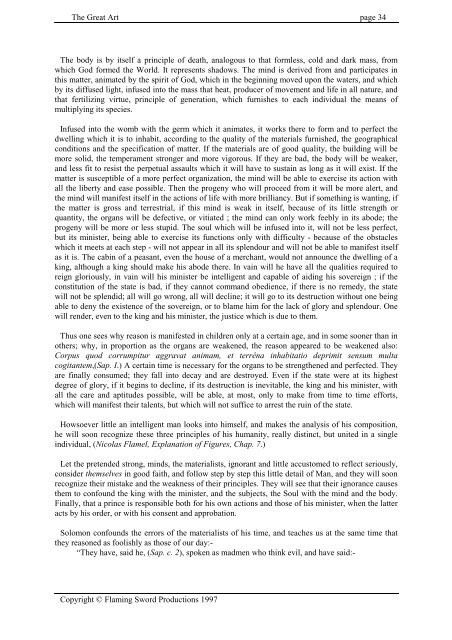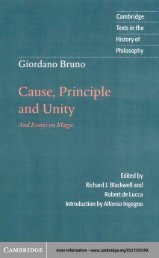The Great Art
Create successful ePaper yourself
Turn your PDF publications into a flip-book with our unique Google optimized e-Paper software.
<strong>The</strong> <strong>Great</strong> <strong>Art</strong> page 34<br />
<strong>The</strong> body is by itself a principle of death, analogous to that formless, cold and dark mass, from<br />
which God formed the World. It represents shadows. <strong>The</strong> mind is derived from and participates in<br />
this matter, animated by the spirit of God, which in the beginning moved upon the waters, and which<br />
by its diffused light, infused into the mass that heat, producer of movement and life in all nature, and<br />
that fertilizing virtue, principle of generation, which furnishes to each individual the means of<br />
multiplying its species.<br />
Infused into the womb with the germ which it animates, it works there to form and to perfect the<br />
dwelling which it is to inhabit, according to the quality of the materials furnished, the geographical<br />
conditions and the specification of matter. If the materials are of good quality, the building will be<br />
more solid, the temperament stronger and more vigorous. If they are bad, the body will be weaker,<br />
and less fit to resist the perpetual assaults which it will have to sustain as long as it will exist. If the<br />
matter is susceptible of a more perfect organization, the mind will be able to exercise its action with<br />
all the liberty and ease possible. <strong>The</strong>n the progeny who will proceed from it will be more alert, and<br />
the mind will manifest itself in the actions of life with more brilliancy. But if something is wanting, if<br />
the matter is gross and terrestrial, if this mind is weak in itself, because of its little strength or<br />
quantity, the organs will be defective, or vitiated ; the mind can only work feebly in its abode; the<br />
progeny will be more or less stupid. <strong>The</strong> soul which will be infused into it, will not be less perfect,<br />
but its minister, being able to exercise its functions only with difficulty - because of the obstacles<br />
which it meets at each step - will not appear in all its splendour and will not be able to manifest itself<br />
as it is. <strong>The</strong> cabin of a peasant, even the house of a merchant, would not announce the dwelling of a<br />
king, although a king should make his abode there. In vain will he have all the qualities required to<br />
reign gloriously, in vain will his minister be intelligent and capable of aiding his sovereign ; if the<br />
constitution of the state is bad, if they cannot command obedience, if there is no remedy, the state<br />
will not be splendid; all will go wrong, all will decline; it will go to its destruction without one being<br />
able to deny the existence of the sovereign, or to blame him for the lack of glory and splendour. One<br />
will render, even to the king and his minister, the justice which is due to them.<br />
Thus one sees why reason is manifested in children only at a certain age, and in some sooner than in<br />
others; why, in proportion as the organs are weakened, the reason appeared to be weakened also:<br />
Corpus quod corrumpitur aggravat animam, et terrêna inhabitatio deprimit sensum multa<br />
cogitantem,(Sap. I.) A certain time is necessary for the organs to be strengthened and perfected. <strong>The</strong>y<br />
are finally consumed; they fall into decay and are destroyed. Even if the state were at its highest<br />
degree of glory, if it begins to decline, if its destruction is inevitable, the king and his minister, with<br />
all the care and aptitudes possible, will be able, at most, only to make from time to time efforts,<br />
which will manifest their talents, but which will not suffice to arrest the ruin of the state.<br />
Howsoever little an intelligent man looks into himself, and makes the analysis of his composition,<br />
he will soon recognize these three principles of his humanity, really distinct, but united in a single<br />
individual, (Nicolas Flamel, Explanation of Figures, Chap. 7.)<br />
Let the pretended strong, minds, the materialists, ignorant and little accustomed to reflect seriously,<br />
consider themselves in good faith, and follow step by step this little detail of Man, and they will soon<br />
recognize their mistake and the weakness of their principles. <strong>The</strong>y will see that their ignorance causes<br />
them to confound the king with the minister, and the subjects, the Soul with the mind and the body.<br />
Finally, that a prince is responsible both for his own actions and those of his minister, when the latter<br />
acts by his order, or with his consent and approbation.<br />
Solomon confounds the errors of the materialists of his time, and teaches us at the same time that<br />
they reasoned as foolishly as those of our day:-<br />
“<strong>The</strong>y have, said he, (Sap. c. 2), spoken as madmen who think evil, and have said:-<br />
Copyright © Flaming Sword Productions 1997

















